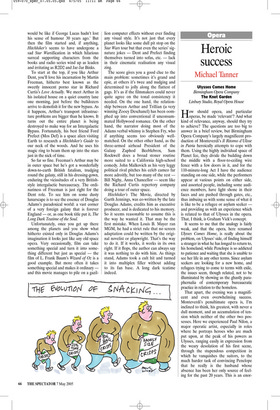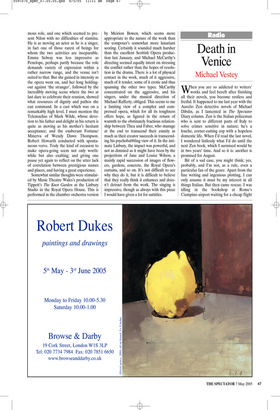Heroic success
Michael Tanner
Ulysses Comes Home Birmingham Opera Company The Knot Garden Linbury Studio, Royal Opera House
How should opera, and particular operas, be made ‘relevant’? And what kind of relevance, anyway, should they try to achieve? The questions are too big to answer in a brief review, but Birmingham Opera Company’s largely magnificent production of Monteverdi’s Il Ritorno d’Ulisse in Patria heroically attempts to cope with them. Using the highly individual space of Planet Ice, they divide the building down the middle with a floor-to-ceiling wire fence with a few doors in it, and for the 110-minute-long Act I have the audience standing on one side, while the performers appear at various points on either side, and assorted people, including some audience members, have light shone in their faces and are pushed through gates, etc., thus imbuing us with some sense of what it is like to be a refugee or asylum seeker and providing us with an experience which is related to that of Ulysses in the opera. That, I think, is Graham Vick’s concept.
It seems to me that the analogy is fairly weak, and that the opera, here renamed Ulysses Comes Home, is really about the problem, on Ulysses’ side, of finding himself a stranger in what he has longed to return to, his homeland, while Penelope is so addicted to patience and waiting that she is unable to see her life in any other terms. Since asylum seekers are looking for a new home, and refugees trying to come to terms with exile, the issues seem, though related, not to be illuminated by showing us the ghastly paraphernalia of contemporary bureaucratic practice in relation to the homeless.
That apart, the evening was a magnificent and even overwhelming success. Monteverdi’s penultimate opera is, I’m inclined to think, his greatest, with never a dull moment, and an accumulation of tension which neither of the other two possesses. Here we experienced Paul Nilon, a major operatic artist, especially in roles where he portrays heroes who are much put upon, at the peak of his powers as Ulysses, ranging easily in expression from the weary desolation of his first scene, through the stupendous competition in which he vanquishes the suitors, to the much harder task of convincing Penelope that he really is the husband whose absence has been her only source of feeling for the past 20 years. This is an enor mous role, and one which seemed to present Nilon with no difficulties of stamina. He is as moving an actor as he is a singer, in fact one of those rarest of beings for whom the two activities are inseparable. Emma Selway was less impressive as Penelope, perhaps partly because the role demands variety of expression within a rather narrow range, and the venue isn’t suited to that. But she gained in intensity as the opera went on, and her long holdingout against ‘the stranger’, followed by the incredibly moving scene where the two at last dare to celebrate their reunion, showed what resources of dignity and pathos she can command. In a cast which was on a remarkably high level, I must mention the Telemachus of Mark Wilde, whose devotion to his father and delight in his return is quite as moving as his mother’s hesitant acceptance; and the exuberant Fortune/ Minerva of Wendy Dawn Thompson. Robert Howarth conducted with spontaneous verve. Truly the kind of occasion to make opera-going seem not only worthwhile but also exalting; and giving one pause yet again to reflect on the utter lack of correlation between prestigious names and places, and having a great experience.
Somewhat similar thoughts were stimulated by Music Theatre Wales’s production of Tippett’s The Knot Garden at the Linbury Studio in the Royal Opera House. This is performed in the chamber orchestra version by Meirion Bowen, which seems more appropriate to the nature of the work than the composer’s somewhat more luxuriant scoring. Certainly it sounded much harsher than the excellent Scottish Opera production last January, and Michael McCarthy’s directing seemed equally intent on stressing the conflict rather than the hopes of resolution in the drama. There is a lot of physical contact in the work, much of it aggressive, much of it tender, some of it erotic and thus spanning the other two types. McCarthy concentrated on the aggressive, and his singers, under the musical direction of Michael Rafferty, obliged. This seems to me a limiting view of a complex and compressed opera, which for all its toughness offers hope, as figured in the return of warmth to the obstinately fractious relationship between Thea and Faber, who manage at the end to transcend their enmity as much as their creator succeeds in transcending his psychobabbling view of it. In the intimate Linbury, the impact was powerful, and not as dimmed as it might have been by the projections of Jane and Louise Wilson, a mainly rapid succession of images of flowers, gardens, concrete, the Royal Opera’s curtains, and so on. It’s not difficult to see why they do it, but it is difficult to believe that they really think it enhances and doesn’t detract from the work. The singing is impressive, though as always with this piece I would have given a lot for surtitles.




























































 Previous page
Previous page